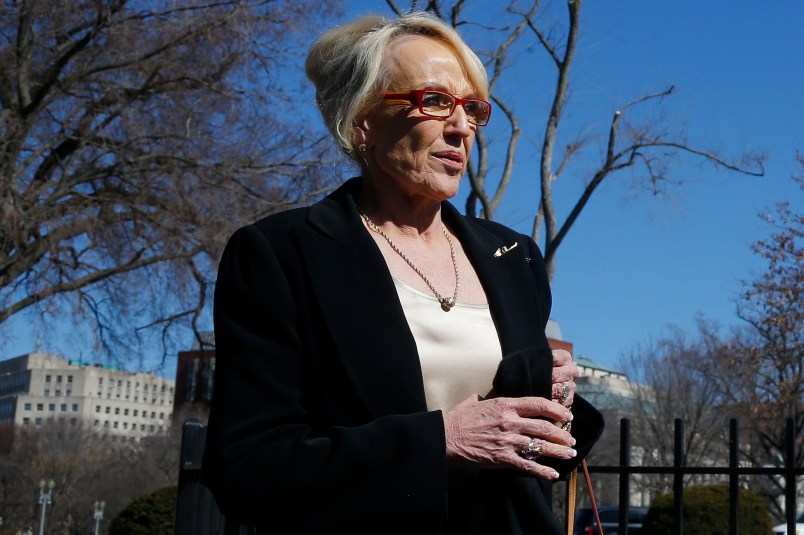In 2012, the conservative “campaign for religious liberty” looked like a smart and possibly winning strategic gambit. Aimed specifically at the Affordable Care Act’s contraception coverage mandate, nestled in a broader claim of institutional and individual exemptions from complex and sometimes unpopular laws and regulations, the campaign linked the Conference of U.S. Catholic Bishops with conservative evangelicals and both to the Republican politicians (including presidential candidate Mitt Romney) who made it a new front in both their anti-Obamacare and “family values” messaging.
Some leading Catholic Democrats (e.g., E.J. Dionne) feared it would become a crucial wedge issue. And it gave a nice First Amendment gloss to unseemly culturally reactionary impulses, while providing mainstream respectability to the “constitutional conservative” claim that church-state separation was a threat to faith itself.
Two years later, the “religious liberty” crusade shows signs of backfiring. This very day, Arizona Gov. Jan Brewer may veto a bill just passed by a legislature controlled by her own party that provides a broad exemption from discrimination laws to businesses and individuals claiming compliance violates their beliefs. And more generally, an argument that once distracted from the extremist nature of conservative Christian objections to gay rights and reproductive rights is drawing attention to them in a dangerous way.
This began happening first on the contraception coverage front, where the religious objection to the Obamacare mandate had to be justified (in the Hobby Lobby litigation most notably) by the claim that highly effective contraceptive devices (the IUD) and treatments (Plan B and hormonal “patches”) used by millions of women were in fact “abortifacients.”
This is not a terribly common view outside the Right-to-Life movement and the conservative Catholic and evangelical Protestant clergy; it certainly is not in accord with mainstream medical opinion. But the very discussion of angels-dancing-on-a-pin disputes over fertilization versus uterine implantation as the beginning of pregnancy shifted the debate over reproductive policy away from the strongest ground for anti-choicers — rare but controversial late-term abortions and the conditions under which they should be allowed — to the very weakest: “abortions” so early that most Americans don’t consider them abortions at all. So a gambit designed to broaden support for faith-based objections to reproductive rights policies is pulling the discussion in a direction that threatens to isolate anti-choicers and their Republican allies in a small ghetto of extremist opinion.
Similarly, the effort to “protect” religious believers from the consequences of a sudden shift in policies on same-sex marriage began as a reasonable-sounding request for two-way tolerance that might unite the near-majority of Americans who are not presently “comfortable” towards marriage equality with those whose views had recently “evolved.”
But the more the demands for religious “exemptions” from compliance with new marriage laws have become concrete, the less reasonable they have seemed. Nobody’s talking about requiring that religious communities perform same-sex marriages (or for that matter, ordain gay ministers, the most heated issue within many U.S. Christian communities). So the martyr’s cross of the “persecuted” must be found among the small ranks of marriage professionals who refuse to bake wedding cakes with two plastic men on top, or offer to offer planning services to two women.
Perhaps some non-sectarian Americans instinctively identify with “bakers of conscience” or wedding planners who consider themselves in danger of hellfire for booking hotel ballrooms for Sodomites. But like the fight for the freedom to treat IUDs as death machines, the fight to provide the conservative Christian elements of the wedding industry with plenary indulgences from obedience to the law tends to elicit less sympathy than ridicule from the non-aligned.
And that matters a great deal politically. On many fronts in the culture wars, the momentum has usually been possessed by those who can best identify themselves with the ambivalent attitudes of a mushy middle “swing vote”—favorable to contraceptives and early-term abortions but not late-term abortions; increasingly accepting of LGBT folk but indulgent of their parents’ and grandparents’ “ick factor.”
After years of shedding crocodile tears for the victims of late-term abortions, anti-choicers are now finding themselves defending businesses who in open court argue that the dividing line between acceptable contraception and murderous abortion occurs moments after sexual intercourse — when women instantly transition from autonomous individuals to “hosts” for a state-protected zygote. And after years of arguing against marriage equality on behalf of the positive “rights” of men and women in “traditional marriage,” those who actually think gay people in love are abominations unto the Lord are being exposed for who they really are.
Ed Kilgore is the principal blogger for Washington Monthly’s Political Animal blog, Managing Editor of The Democratic Strategist, and a Senior Fellow at theProgressive Policy Institute. Earlier he worked for three governors and a U.S. Senator. He can be followed on Twitter at @ed_kilgore.






